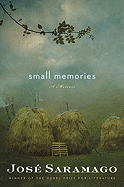
Nobel Prize-winner Jose Saramago found a touching way to say goodbye to his readers in this short, fragile, posthumously published memoir. Saramago describes growing up in the rustic, ancient Portuguese village of Azinhaga, taking us back through "the illegible pages of destiny," from the thrill of first learning to read to the horror of witnessing his father beating his mother.
Saramago, meaning wild radish, was not a family name but a nickname by which his family was known in the village, made official by a drunk clerk at the registry office. That's just one of the old handed-down tales that Saramago loves, but while he treats us to his very brief adventure hooking the biggest fish in the river, he also shares tragedies like his four-year-old brother's death.
Saramago's family survived in a world of barely enough money, where the house blankets were pawned in the summer only to be bought back in cold weather. The book abounds in poignant moments, like when Saramago's grandfather, a few days before his death, embraces the trees in his garden one by one to say goodbye and thank them for their shade and fruit.
His memory disoriented and faltering as he attempts to peer back at a childhood 80 years in the past, Saramago allows us to join him in savoring "the small memories of when I was small." Sometimes not recalling the exact order of things, the great writer returns to events again to deepen them with new details, with "the courage to turn the coin over and show you the other side."--Nick DiMartino

